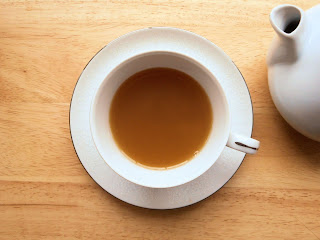Recipe: Russian Tea
As I was going through some old cookbooks I have in hopes of being inspired to veganize something (life is not very exciting here in quarantine), I found some recipes that were vegan to begin with. But when I tried the original recipe for Russian Tea I found in 2006's All New Complete Cooking Light Cookbook, I just didn't like it. It used ground-up spices and that made the tea weirdly gritty and unpleasant.
But I still liked the idea and the flavors, so I improved on the recipe (for my purposes, anyway; maybe some people prefer the convenience/lesser expense of ground spices). And here you are!
Before we move on, though, a word on Russian tea: It isn't really Russian. The first printed reference apparently came from an 1882 New York Times article. I looked up the article; it was pretty strange. In it, a Dr. Richardson said drinking alcohol was bad while riding tricycles, as it was apt to be "embarrassing," but also drinking overly sweetened tea would make you thirsty, and he was skeptical of drinking tea with lemon ("Russian tea") because lemon might also make a person more thirsty or cause heartburn. In the end he recommended lightly sweetened tea brewed in milk and carried in a flask to be taken out with you tricycling. This probably raises so many questions, but you came here for a tea recipe, not a look back at weird medical opinions or oddly detailed concerns about riding tricycles while tipsy or thirsty being printed in the New York Times.
Today, so-called Russian tea is essentially the American South's hot tea--though iced tea is their go-to, in cold weather, many would reach for a black tea flavored with lemons or oranges and various spices. This 1896 recipe asks for a candied cherry, saying that it stands in for the Russians putting strawberries in their tea. This raises more questions, but I digress again.
This is a simple recipe (without candied cherries) and is just a way of shaking things up when you get bored of plain tea or tea with lemon. (I am continually in need of shaking something around here!) Mine uses orange juice rather than lemon, as is in the original Cooking Light recipe and as is a common variation of Russian Tea.
Russian Tea
Serves: 1
1 bag of black tea (decaf is fine; it's what I used)
1 cinnamon stick
1 whole clove
3/4 cup boiling water
1/4 cup orange juice
Sugar to taste (optional)
Pour boiling water over tea bag, cinnamon stick, and clove. Cover and steep for 4-5 minutes. It is best to do this in a preheated teapot, but use what you have. Remove and discard tea bag, clove, and cinnamon stick. Stir in orange juice and sugar (if using). Serve immediately.
But I still liked the idea and the flavors, so I improved on the recipe (for my purposes, anyway; maybe some people prefer the convenience/lesser expense of ground spices). And here you are!
Before we move on, though, a word on Russian tea: It isn't really Russian. The first printed reference apparently came from an 1882 New York Times article. I looked up the article; it was pretty strange. In it, a Dr. Richardson said drinking alcohol was bad while riding tricycles, as it was apt to be "embarrassing," but also drinking overly sweetened tea would make you thirsty, and he was skeptical of drinking tea with lemon ("Russian tea") because lemon might also make a person more thirsty or cause heartburn. In the end he recommended lightly sweetened tea brewed in milk and carried in a flask to be taken out with you tricycling. This probably raises so many questions, but you came here for a tea recipe, not a look back at weird medical opinions or oddly detailed concerns about riding tricycles while tipsy or thirsty being printed in the New York Times.
Today, so-called Russian tea is essentially the American South's hot tea--though iced tea is their go-to, in cold weather, many would reach for a black tea flavored with lemons or oranges and various spices. This 1896 recipe asks for a candied cherry, saying that it stands in for the Russians putting strawberries in their tea. This raises more questions, but I digress again.
This is a simple recipe (without candied cherries) and is just a way of shaking things up when you get bored of plain tea or tea with lemon. (I am continually in need of shaking something around here!) Mine uses orange juice rather than lemon, as is in the original Cooking Light recipe and as is a common variation of Russian Tea.
Russian Tea
Serves: 1
1 bag of black tea (decaf is fine; it's what I used)
1 cinnamon stick
1 whole clove
3/4 cup boiling water
1/4 cup orange juice
Sugar to taste (optional)
Pour boiling water over tea bag, cinnamon stick, and clove. Cover and steep for 4-5 minutes. It is best to do this in a preheated teapot, but use what you have. Remove and discard tea bag, clove, and cinnamon stick. Stir in orange juice and sugar (if using). Serve immediately.



Yeah, OK, so I have a LOT of questions about the origins of this tea. *laugh face emoji would be here*
ReplyDeleteWhat I have read suggests fancy Russians had a reputation for drinking tea with lemon or oranges and that became known as "Russian tea" as a result. But how that got translated into being bad to drink while on a tricycle...you and I both have questions!
Delete